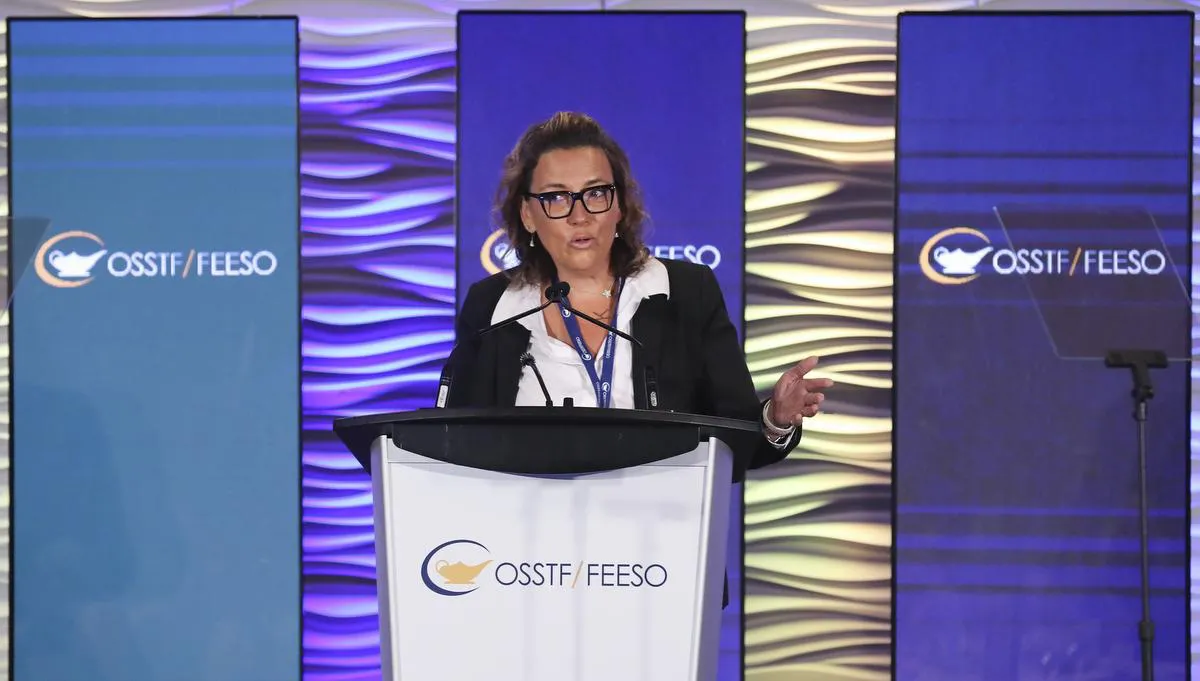
Ontario teachers need to pay attention to the Ford government’s move to allow more private delivery in the public health care system because education could be next, warns the president of the Ontario Secondary School Teachers’ Federation.
But Karen Littlewood, speaking Saturday to members gathered in downtown Toronto for their annual provincial meeting, said the recent union solidarity during CUPE education worker talks, as well as big union wins in court, show the “extent of this collective power” in fighting the provincial government.
“Last year, when (Premier Doug) Ford tried to bypass the bargaining process and use the notwithstanding clause to force a contract on CUPE’s 55,000 education worker members, we were there with all of labour … There with unions and labour activists from coast to coast to coast,” she said.
“We were united by a just cause,” she added. “And we did not waver. Our collective power and solidarity made all the difference. And we won. Ford was forced to back down” and withdraw the controversial legislation.
She also noted the “significant wins” unions have had in challenging government legislation, including Bill 124, which capped public sector raises at 1 per cent each year for four years and was recently ruled unconstitutional.
Last week, her union and the Elementary Teachers’ Federation of Ontario and the Ontario English Catholic Teachers’ Federation celebrated after Bill 307, which limited spending by unions and other third parties, was also found unconstitutional.
“The court found that Bill 307 ‘unjustifiably infringed’ on the rights of Ontarians to meaningfully participate in our province’s political processes,” Littlewood said. “This was not only vindicating for us, but a win for democracy and freedom of expression. And I want to point out the pattern that is developing here — Ford introduces oppressive, unconstitutional legislation (and) we challenge it, we win, and then they appeal. And more taxpayer dollars are wasted.”
Teachers are currently involved in negotiations with the provincial government, after contracts expired last August.
Education Minister Stephen Lecce told the Star last week that “we’ve had good faith negotiations” and “we’ve been working very hard, really since the summer for all education unions that were willing to meet with us — some were not available.
“We started early on the basis of we want to get these deals done, to create some stability … I think there’s been constructive undertones.”
He said the government wants to “get a deal that is fair to the workers and to keeps these kids coming to school after years of difficulty. So I look forward to getting these deals done.” He said private mediation could help.
Littlewood said the union was unhappy about government announcements last week that came without any notice to teachers.
“Just this week, again no consultation with us or any education union, they announced a fast-track program for students to head into apprenticeship (in Grade 11) leaving teachers completely out of the equation,” she said.
That move is meant to help boost the number of teens choosing careers in the skilled trades, allowing them to take on apprenticeships in Grade 11 and still earn a high school diploma.
On Friday, Lecce announced that all high school students, starting with those in Grade 9 in 2024, will have to earn a technology credit in order to graduate.
The Ontario Principals’ Council has said there aren’t enough tech educators in the system to teach all the additional courses required.
by Kristin Rushowy of The Toronto Star as published in The Standard of St.Catharines.

